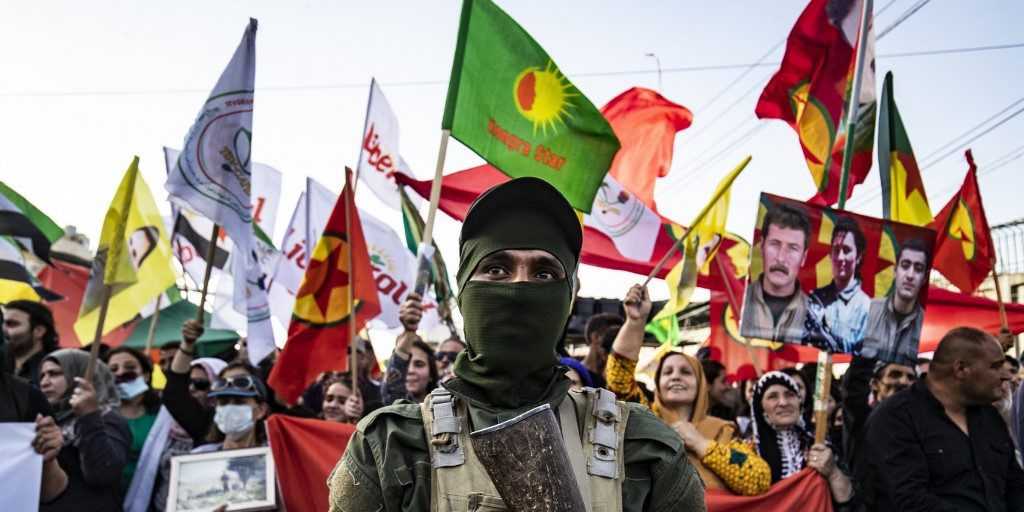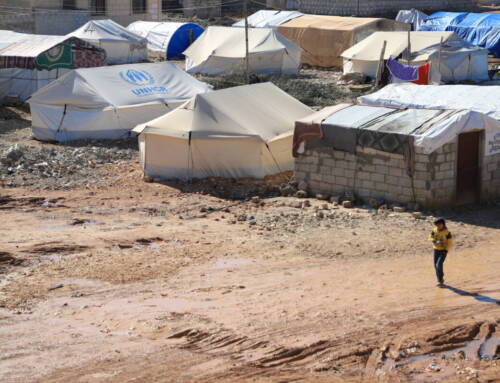Red tape in northeast Syria: Kurdish political tensions shrink the media space
The closure of the Kurdistan24 bureau in northeast Syria by local authorities reveals a restricted media space, against the backdrop of mounting Kurdish political tensions.
23 June 2021
AMMAN — On Sunday, the Kurdish-dominated Autonomous Administration of North and East Syria (AANES) closed the northeast Syria bureau of the Iraqi Kurdistan-based media outlet Kurdistan24.
“The shutting down of the Kurdistan 24 Rojava [the Kurdish name of Syria’s northeast region] bureau is a blatant violation of media freedom and a worrisome sign of the Rojava authorities’ disregard for press freedom, as well as an attempt to suppress views they oppose,” Kurdistan24 said in a statement shortly after.
The forcible closure occurred without prior notice or warning. “We don’t know yet if it is a temporary or permanent decision, and we don’t know whether they’ll allow us to work again,” Joanne Stocker, the editor-in-chief of Kurdistan24 English, told Syria Direct.
The AANES subsequently issued a declaration justifying the decision to close the bureau and revoke Kurdistan24’s media license on grounds of inciting hate speech and promoting intra-Kurdish fighting, an accusation refuted by the Kurdistan24 staff.
“Our work in Rojava is in compliance with their media rules,” Stocker argued. “Our reporters have a good relationship with the international coalition against ISIS in Syria, and we are fair and professional in our reporting in the region.”
A political decision?
Kurdistan24 denounced a politically-motivated decision, stating that “Rojava officials (…) may very well have been pressured by influential groups in the area to shut down our bureau.”
Tensions have mounted in recent weeks between the Iraq-based Kurdistan Democratic Party (KPD), dominated by the Barzani clan, and the Turkey-based Kurdistan Workers’ Party (PKK), with ripple effects on Kurdish politics in northeast Syria.
Based in Erbil, the capital of the autonomous Kurdistan region of Iraq, Kurdistan24 is closely affiliated to the family of Masrour Barzani, the current Prime Minister of the Iraqi Kurdistan region.
The AANES’ decision may come in retaliation to the arrest of Jihad Hassan, the representative of the AANES in Erbil, by the Iraqi Kurdistan authorities on June 10. In what has widely been interpreted as a reaction to the arrest, on June 22, the AANES announced the closing of the Semalka border crossing with Iraqi Kurdistan, although on June 23 it said the crossing would remain open for humanitarians.
Tensions have mounted in recent weeks between the Iraq-based Kurdistan Democratic Party (KPD), dominated by the Barzani clan, and the Turkey-based Kurdistan Workers’ Party (PKK), with ripple effects on Kurdish politics in northeast Syria.
The historical enmity between the KPD and the PKK reflects the opposition of two dominant ideological streams (among the many that shape Kurdish political life): one founded on Marxist principles and embodied by the PKK, and another proposing a more centralized approach, taken up by the KPD.
The real heart of the conflict crystallizes, however, around the two parties’ respective relationships with Turkey. While the PKK and Turkey are sworn historical enemies, the KPD has adopted a cooperative stance towards Ankara.
Earlier this month, the death of five KPD fighters kindled strong tensions, with the KPD accusing the PKK of ambushing its fighters. The PKK, which blames the KPD for colluding with Ankara to enable Turkish cross-border operations against its bases, denied responsibility for the killing.
Media freedom has severely deteriorated in Iraqi Kurdistan, where five journalists were sent to jail last March in relation to their coverage of anti-KPD protests. Likewise, in northeast Syria, media outlets struggle to navigate political “red tape” and fear losing their media licenses.
In turn, Syrian Kurdish political life has been deeply permeated by this long-running division. Nicknamed “the Qandil leadership” for their residence in the Qandil mountains on the Iraqi-Turkish border, leaders of the PKK exert a disputed influence on the AANES through the Democratic Union Party (PYD), considered to be the Syrian branch of the PKK.
“We suspect the decision [to close the bureau] came from Qandil leadership but was relayed through the officials in Northeast Syria,” Stocker added. “The impact it’s having is that there is no media allowed to work who are not pro-PYD, and many Kurds in Rojava are left without a voice.”
Media wars
As illustrated by the latest escalatory cycle of political provocations and retaliations, the media is often the first collateral victim of intra-Kurdish tensions.
Media freedom has severely deteriorated in Iraqi Kurdistan, where five journalists were sent to jail last March in relation to their coverage of anti-KPD protests. Likewise, in northeast Syria, media outlets struggle to navigate political “red tape” and fear losing their media licenses.
The politicization of the media does not help. Many of the main channels in northeast Syria are affiliated with a political party, such as Rudaw and Kurdistan24, both associated with the KPD.
The space for free journalism will continue to shrink as media outlets become increasingly embroiled in political disputes or are forced to abandon these sensitive topics entirely.







